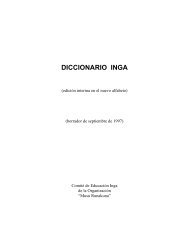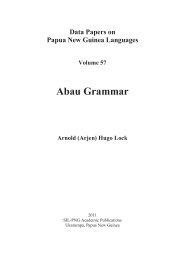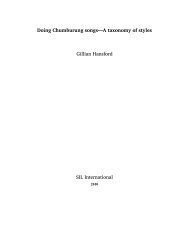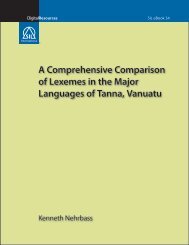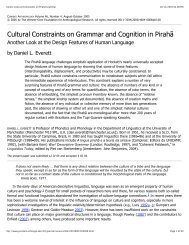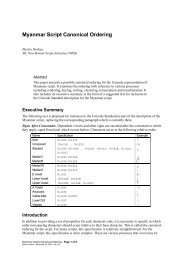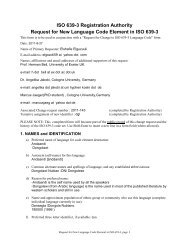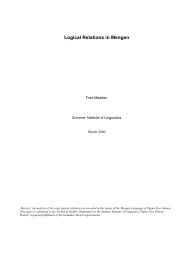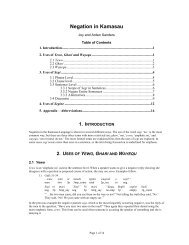The code model of communication: a powerful - SIL International
The code model of communication: a powerful - SIL International
The code model of communication: a powerful - SIL International
Create successful ePaper yourself
Turn your PDF publications into a flip-book with our unique Google optimized e-Paper software.
1. ‘Communication’: A Fundamental Concept in<br />
Linguistic Metatheory<br />
1.1. Introductory comments<br />
Most studies conducted within the field <strong>of</strong> linguistics are justly described as<br />
linguistic studies. <strong>The</strong>y <strong>of</strong>fer analyses or discussion <strong>of</strong> some element <strong>of</strong> language. While<br />
conducted from within the field <strong>of</strong> linguistics, this study is not so much a linguistic study<br />
as it is a study <strong>of</strong> linguistics. In general terms, it is an examination <strong>of</strong> how linguists go<br />
about their trade. And, importantly, it is an examination conducted by an insider—by a<br />
participant—rather than simply a collection <strong>of</strong> observations made by an outsider. Specifically,<br />
the study is a review <strong>of</strong> the history <strong>of</strong> a particular idealized <strong>model</strong> <strong>of</strong> <strong>communication</strong>,<br />
which has been employed within the discipline for nearly fifty years. It is an<br />
examination <strong>of</strong> how that <strong>model</strong> developed, spread, and gained influence within the<br />
discipline, and how, on some fronts, that influence has begun to wane.<br />
<strong>The</strong> <strong>model</strong> in question has been called the <strong>code</strong> <strong>model</strong> <strong>of</strong> <strong>communication</strong>. 1 It is a<br />
basic <strong>model</strong> <strong>of</strong> <strong>communication</strong> and expresses the idea that <strong>communication</strong> is the<br />
transmission and reception <strong>of</strong> information between a human source (en<strong>code</strong>r) and<br />
receiver (de<strong>code</strong>r) using a signaling system. David Crystal, in the standard reference<br />
work, A Dictionary <strong>of</strong> Linguistics & Phonetics, even employs the <strong>model</strong> in defining<br />
<strong>communication</strong>, noting that “in theory, <strong>communication</strong> is said to have taken place if the<br />
information received is the same as that sent” (Crystal 2003:85). Edmondson and<br />
Burquest (1998:95–96) comment that, as proposed in this view, “language is a kind <strong>of</strong><br />
<strong>code</strong>, and communicating is the process <strong>of</strong> encoding concepts and its inverse decoding.<br />
<strong>The</strong> notion is quite familiar and so intuitive that the question may be asked whether there<br />
is any conceivable alternative to it.” This study asserts that the <strong>code</strong> <strong>model</strong> concept <strong>of</strong><br />
<strong>communication</strong> has been fundamental to the metatheory <strong>of</strong> contemporary linguistics (see<br />
Crystal 2003:85).<br />
<strong>The</strong> notion <strong>of</strong> metatheory itself bears some discussion, for in some circles, metatheory<br />
is taken to signify theory-free or theory-neutral elements in a research tradition.<br />
On philosophical grounds this study must reject the assertion that any element <strong>of</strong> a<br />
research tradition could be theory-free or theory-neutral. Obviously then, this is not the<br />
sense <strong>of</strong> metatheory employed here. Rather, by metatheory is meant the “underlying<br />
beliefs that generate a particular approach.” This use <strong>of</strong> the term metatheory is analogous<br />
to “ideology” or “theoretical presupposition” (Figueroa 1994:4).<br />
In exploring similarities and differences between schools <strong>of</strong> thought within linguistics,<br />
this study goes beyond the means <strong>of</strong> analysis or description employed by various<br />
1 <strong>The</strong> neologism seems to have originated with Sperber and Wilson (1986:2).<br />
1



